Analysis of UK Legal System: Classifications, Courts, Sources of Law
VerifiedAdded on 2023/06/13
|10
|2572
|445
Report
AI Summary
This report provides a comprehensive overview of the English legal system, beginning with a definition of law and its classifications, including civil and criminal law. It elaborates on the roles of the High Court and Supreme Court within the English legal system, highlighting their jurisdictions and responsibilities. The report also discusses sources of law, such as case law and the law-making process, including delegated legislation. Furthermore, it examines UK employment law, focusing on the statutory duties of corporations towards their employees, as well as the distinctions between wrongful and unfair dismissal. The report concludes by emphasizing the importance of legislation in managing society and ensuring effective governance. Desklib provides access to similar solved assignments and study resources for students.
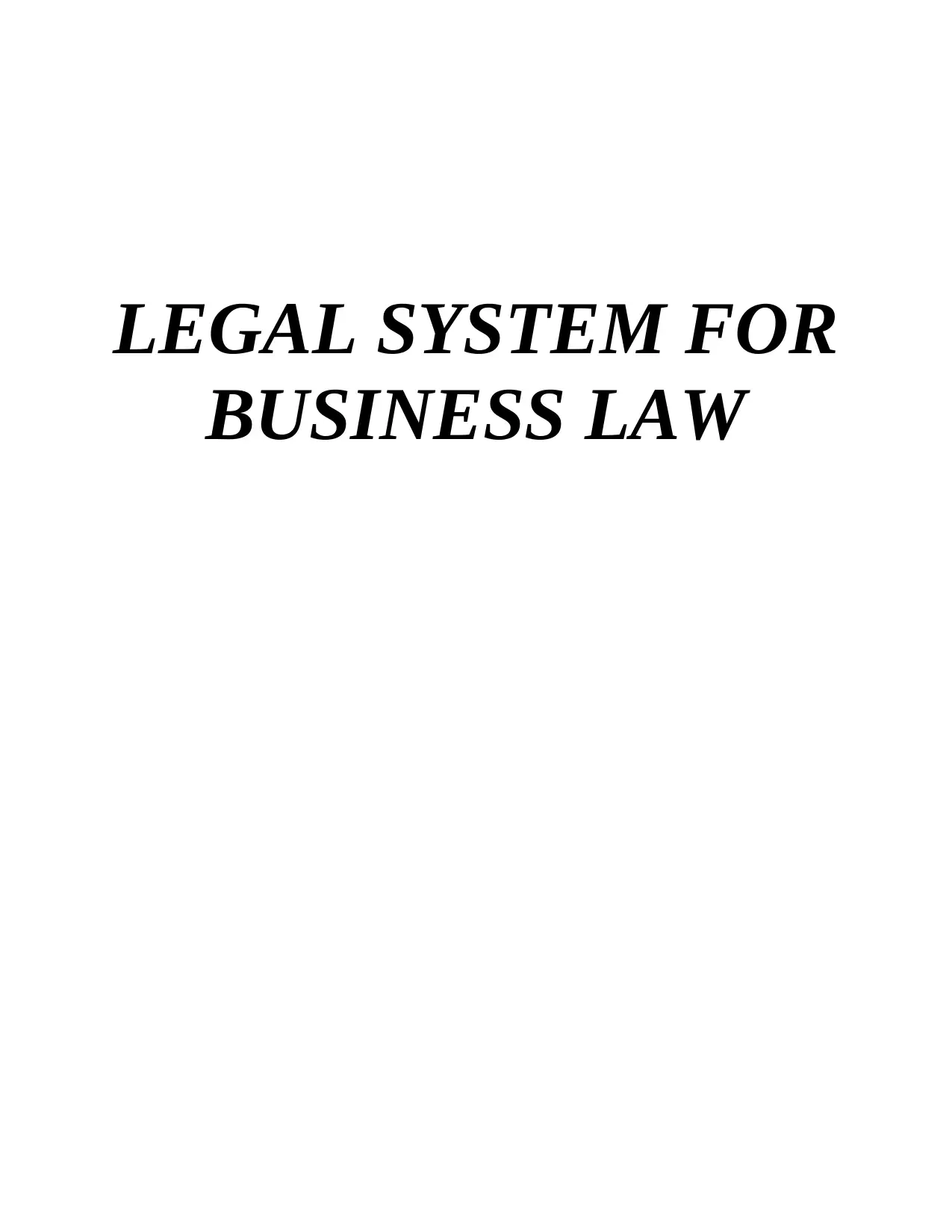
LEGAL SYSTEM FOR
BUSINESS LAW
BUSINESS LAW
Paraphrase This Document
Need a fresh take? Get an instant paraphrase of this document with our AI Paraphraser
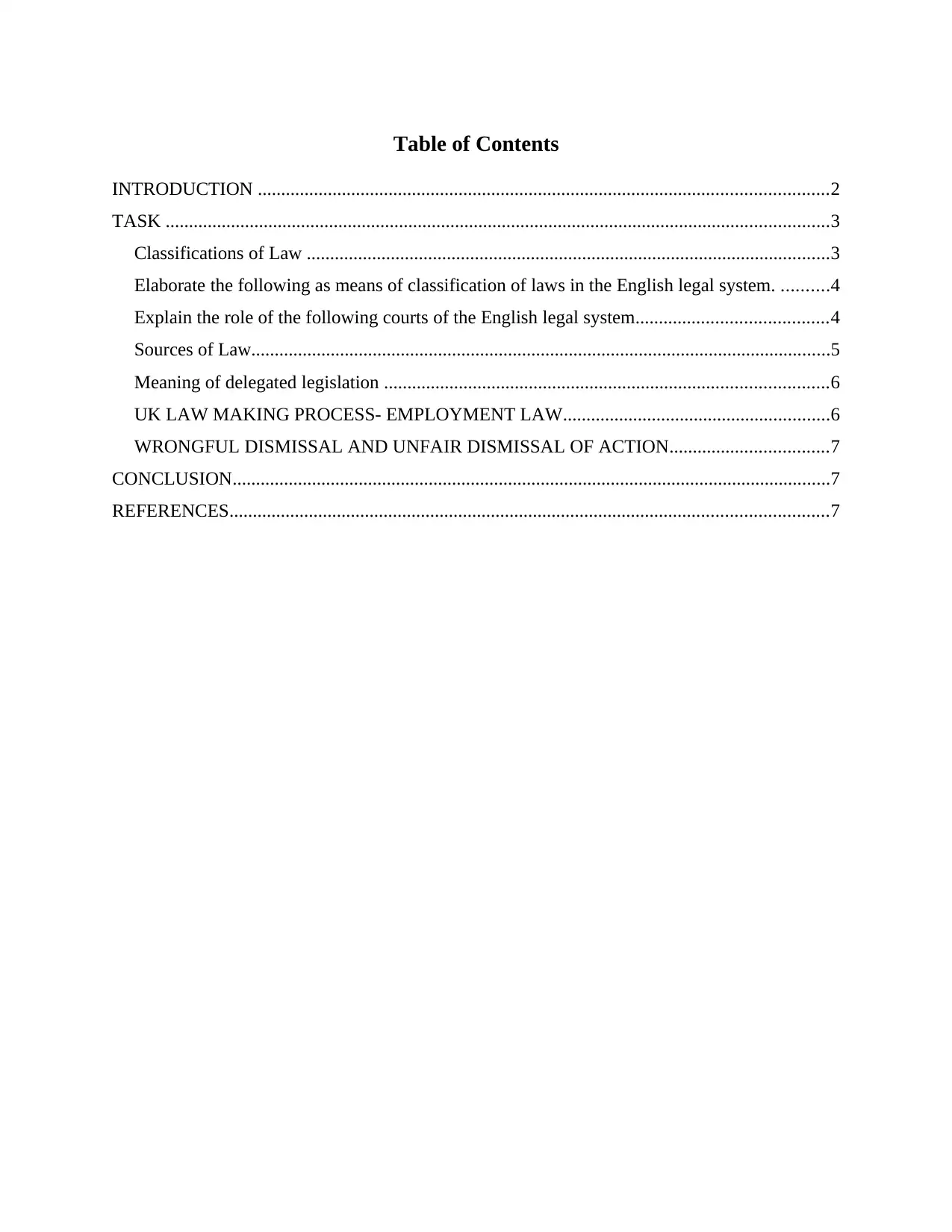
Table of Contents
INTRODUCTION ..........................................................................................................................2
TASK ..............................................................................................................................................3
Classifications of Law ................................................................................................................3
Elaborate the following as means of classification of laws in the English legal system. ..........4
Explain the role of the following courts of the English legal system.........................................4
Sources of Law............................................................................................................................5
Meaning of delegated legislation ...............................................................................................6
UK LAW MAKING PROCESS- EMPLOYMENT LAW.........................................................6
WRONGFUL DISMISSAL AND UNFAIR DISMISSAL OF ACTION..................................7
CONCLUSION................................................................................................................................7
REFERENCES................................................................................................................................7
INTRODUCTION ..........................................................................................................................2
TASK ..............................................................................................................................................3
Classifications of Law ................................................................................................................3
Elaborate the following as means of classification of laws in the English legal system. ..........4
Explain the role of the following courts of the English legal system.........................................4
Sources of Law............................................................................................................................5
Meaning of delegated legislation ...............................................................................................6
UK LAW MAKING PROCESS- EMPLOYMENT LAW.........................................................6
WRONGFUL DISMISSAL AND UNFAIR DISMISSAL OF ACTION..................................7
CONCLUSION................................................................................................................................7
REFERENCES................................................................................................................................7
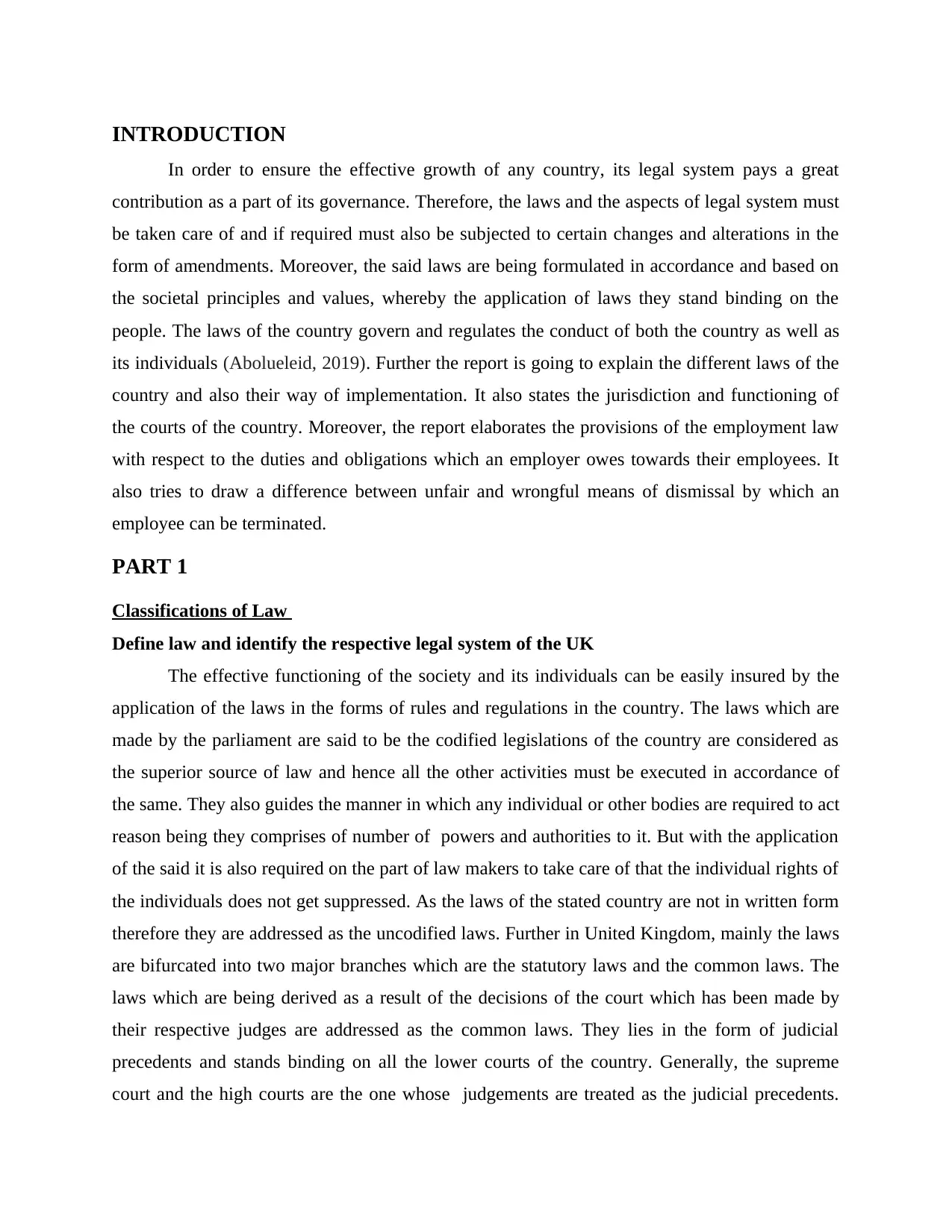
INTRODUCTION
In order to ensure the effective growth of any country, its legal system pays a great
contribution as a part of its governance. Therefore, the laws and the aspects of legal system must
be taken care of and if required must also be subjected to certain changes and alterations in the
form of amendments. Moreover, the said laws are being formulated in accordance and based on
the societal principles and values, whereby the application of laws they stand binding on the
people. The laws of the country govern and regulates the conduct of both the country as well as
its individuals (Abolueleid, 2019). Further the report is going to explain the different laws of the
country and also their way of implementation. It also states the jurisdiction and functioning of
the courts of the country. Moreover, the report elaborates the provisions of the employment law
with respect to the duties and obligations which an employer owes towards their employees. It
also tries to draw a difference between unfair and wrongful means of dismissal by which an
employee can be terminated.
PART 1
Classifications of Law
Define law and identify the respective legal system of the UK
The effective functioning of the society and its individuals can be easily insured by the
application of the laws in the forms of rules and regulations in the country. The laws which are
made by the parliament are said to be the codified legislations of the country are considered as
the superior source of law and hence all the other activities must be executed in accordance of
the same. They also guides the manner in which any individual or other bodies are required to act
reason being they comprises of number of powers and authorities to it. But with the application
of the said it is also required on the part of law makers to take care of that the individual rights of
the individuals does not get suppressed. As the laws of the stated country are not in written form
therefore they are addressed as the uncodified laws. Further in United Kingdom, mainly the laws
are bifurcated into two major branches which are the statutory laws and the common laws. The
laws which are being derived as a result of the decisions of the court which has been made by
their respective judges are addressed as the common laws. They lies in the form of judicial
precedents and stands binding on all the lower courts of the country. Generally, the supreme
court and the high courts are the one whose judgements are treated as the judicial precedents.
In order to ensure the effective growth of any country, its legal system pays a great
contribution as a part of its governance. Therefore, the laws and the aspects of legal system must
be taken care of and if required must also be subjected to certain changes and alterations in the
form of amendments. Moreover, the said laws are being formulated in accordance and based on
the societal principles and values, whereby the application of laws they stand binding on the
people. The laws of the country govern and regulates the conduct of both the country as well as
its individuals (Abolueleid, 2019). Further the report is going to explain the different laws of the
country and also their way of implementation. It also states the jurisdiction and functioning of
the courts of the country. Moreover, the report elaborates the provisions of the employment law
with respect to the duties and obligations which an employer owes towards their employees. It
also tries to draw a difference between unfair and wrongful means of dismissal by which an
employee can be terminated.
PART 1
Classifications of Law
Define law and identify the respective legal system of the UK
The effective functioning of the society and its individuals can be easily insured by the
application of the laws in the forms of rules and regulations in the country. The laws which are
made by the parliament are said to be the codified legislations of the country are considered as
the superior source of law and hence all the other activities must be executed in accordance of
the same. They also guides the manner in which any individual or other bodies are required to act
reason being they comprises of number of powers and authorities to it. But with the application
of the said it is also required on the part of law makers to take care of that the individual rights of
the individuals does not get suppressed. As the laws of the stated country are not in written form
therefore they are addressed as the uncodified laws. Further in United Kingdom, mainly the laws
are bifurcated into two major branches which are the statutory laws and the common laws. The
laws which are being derived as a result of the decisions of the court which has been made by
their respective judges are addressed as the common laws. They lies in the form of judicial
precedents and stands binding on all the lower courts of the country. Generally, the supreme
court and the high courts are the one whose judgements are treated as the judicial precedents.
⊘ This is a preview!⊘
Do you want full access?
Subscribe today to unlock all pages.

Trusted by 1+ million students worldwide
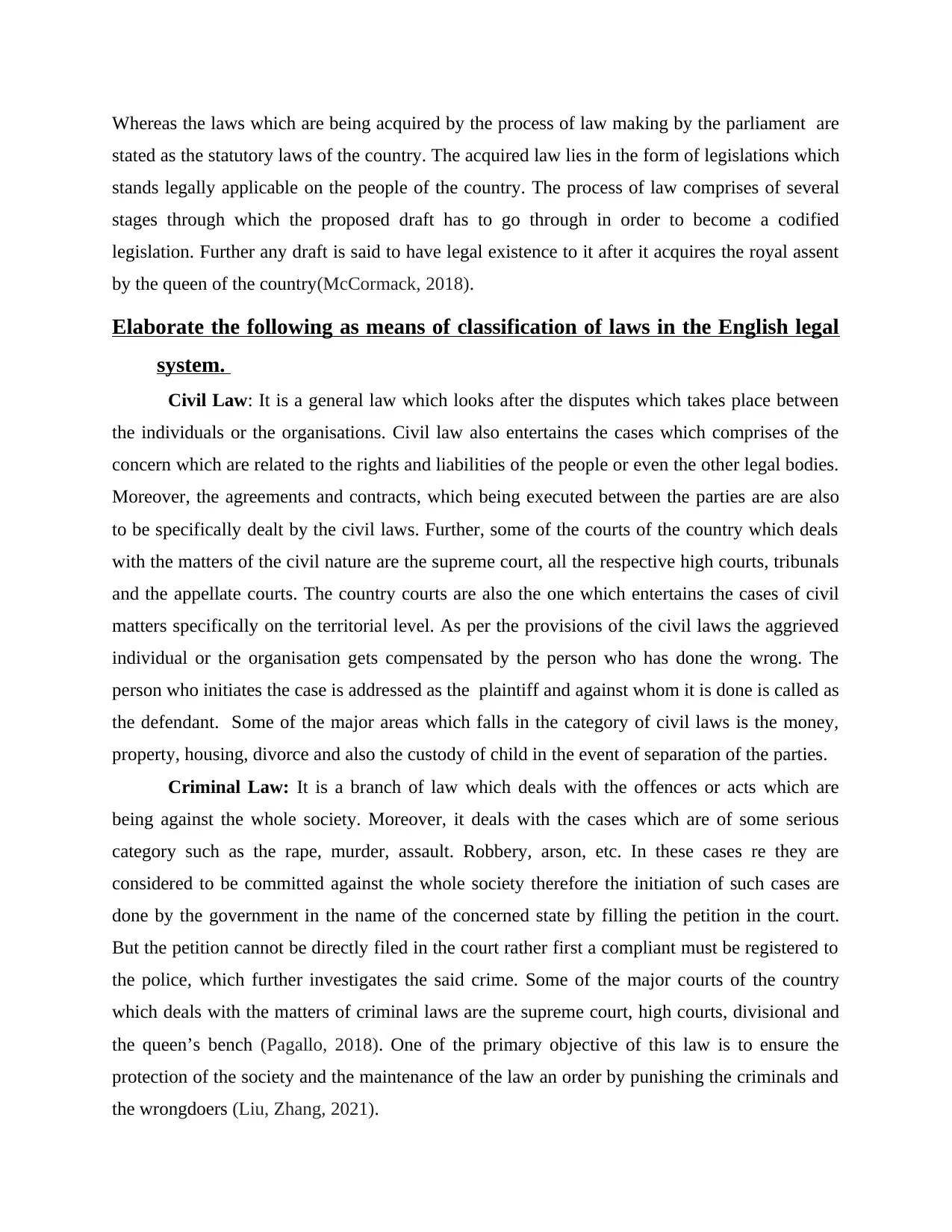
Whereas the laws which are being acquired by the process of law making by the parliament are
stated as the statutory laws of the country. The acquired law lies in the form of legislations which
stands legally applicable on the people of the country. The process of law comprises of several
stages through which the proposed draft has to go through in order to become a codified
legislation. Further any draft is said to have legal existence to it after it acquires the royal assent
by the queen of the country(McCormack, 2018).
Elaborate the following as means of classification of laws in the English legal
system.
Civil Law: It is a general law which looks after the disputes which takes place between
the individuals or the organisations. Civil law also entertains the cases which comprises of the
concern which are related to the rights and liabilities of the people or even the other legal bodies.
Moreover, the agreements and contracts, which being executed between the parties are are also
to be specifically dealt by the civil laws. Further, some of the courts of the country which deals
with the matters of the civil nature are the supreme court, all the respective high courts, tribunals
and the appellate courts. The country courts are also the one which entertains the cases of civil
matters specifically on the territorial level. As per the provisions of the civil laws the aggrieved
individual or the organisation gets compensated by the person who has done the wrong. The
person who initiates the case is addressed as the plaintiff and against whom it is done is called as
the defendant. Some of the major areas which falls in the category of civil laws is the money,
property, housing, divorce and also the custody of child in the event of separation of the parties.
Criminal Law: It is a branch of law which deals with the offences or acts which are
being against the whole society. Moreover, it deals with the cases which are of some serious
category such as the rape, murder, assault. Robbery, arson, etc. In these cases re they are
considered to be committed against the whole society therefore the initiation of such cases are
done by the government in the name of the concerned state by filling the petition in the court.
But the petition cannot be directly filed in the court rather first a compliant must be registered to
the police, which further investigates the said crime. Some of the major courts of the country
which deals with the matters of criminal laws are the supreme court, high courts, divisional and
the queen’s bench (Pagallo, 2018). One of the primary objective of this law is to ensure the
protection of the society and the maintenance of the law an order by punishing the criminals and
the wrongdoers (Liu, Zhang, 2021).
stated as the statutory laws of the country. The acquired law lies in the form of legislations which
stands legally applicable on the people of the country. The process of law comprises of several
stages through which the proposed draft has to go through in order to become a codified
legislation. Further any draft is said to have legal existence to it after it acquires the royal assent
by the queen of the country(McCormack, 2018).
Elaborate the following as means of classification of laws in the English legal
system.
Civil Law: It is a general law which looks after the disputes which takes place between
the individuals or the organisations. Civil law also entertains the cases which comprises of the
concern which are related to the rights and liabilities of the people or even the other legal bodies.
Moreover, the agreements and contracts, which being executed between the parties are are also
to be specifically dealt by the civil laws. Further, some of the courts of the country which deals
with the matters of the civil nature are the supreme court, all the respective high courts, tribunals
and the appellate courts. The country courts are also the one which entertains the cases of civil
matters specifically on the territorial level. As per the provisions of the civil laws the aggrieved
individual or the organisation gets compensated by the person who has done the wrong. The
person who initiates the case is addressed as the plaintiff and against whom it is done is called as
the defendant. Some of the major areas which falls in the category of civil laws is the money,
property, housing, divorce and also the custody of child in the event of separation of the parties.
Criminal Law: It is a branch of law which deals with the offences or acts which are
being against the whole society. Moreover, it deals with the cases which are of some serious
category such as the rape, murder, assault. Robbery, arson, etc. In these cases re they are
considered to be committed against the whole society therefore the initiation of such cases are
done by the government in the name of the concerned state by filling the petition in the court.
But the petition cannot be directly filed in the court rather first a compliant must be registered to
the police, which further investigates the said crime. Some of the major courts of the country
which deals with the matters of criminal laws are the supreme court, high courts, divisional and
the queen’s bench (Pagallo, 2018). One of the primary objective of this law is to ensure the
protection of the society and the maintenance of the law an order by punishing the criminals and
the wrongdoers (Liu, Zhang, 2021).
Paraphrase This Document
Need a fresh take? Get an instant paraphrase of this document with our AI Paraphraser
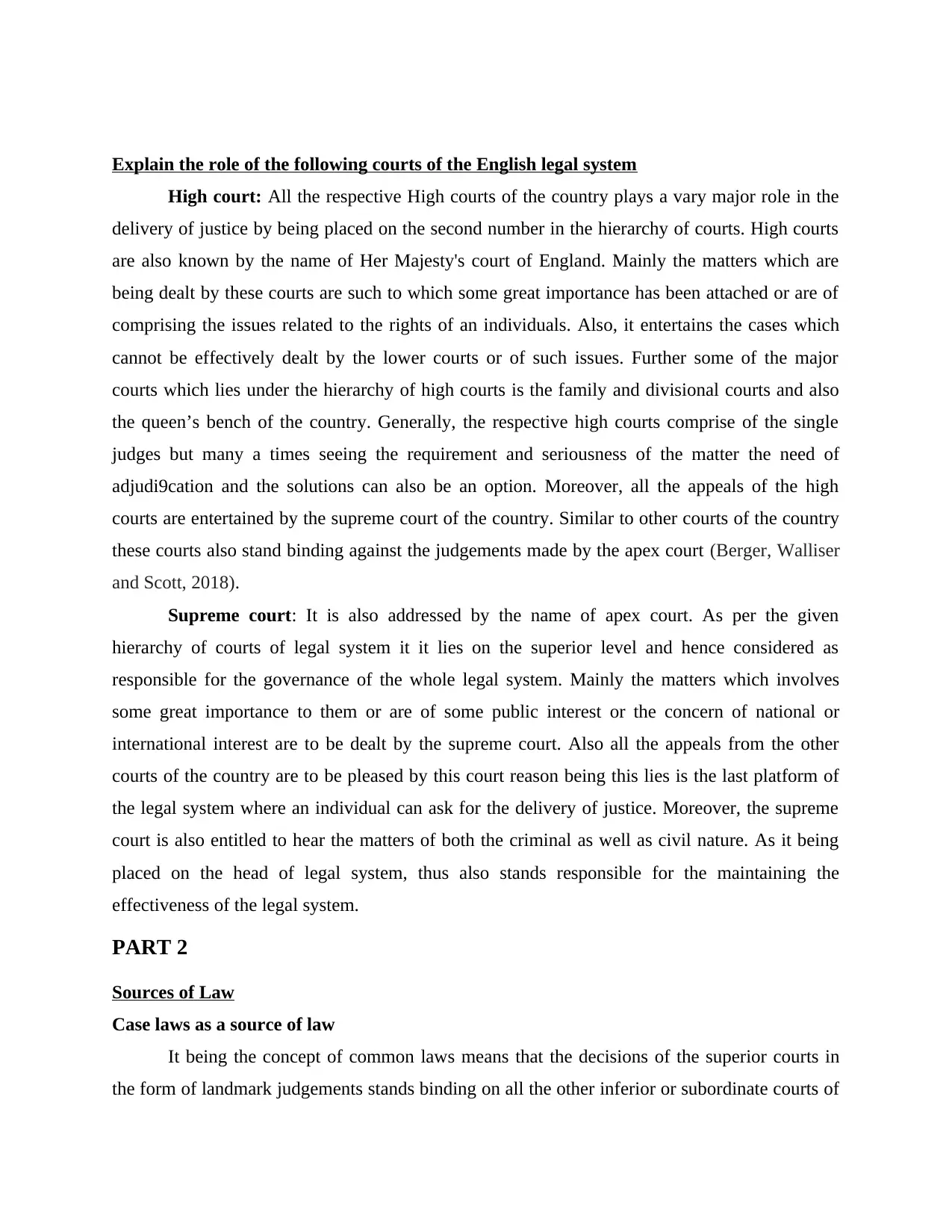
Explain the role of the following courts of the English legal system
High court: All the respective High courts of the country plays a vary major role in the
delivery of justice by being placed on the second number in the hierarchy of courts. High courts
are also known by the name of Her Majesty's court of England. Mainly the matters which are
being dealt by these courts are such to which some great importance has been attached or are of
comprising the issues related to the rights of an individuals. Also, it entertains the cases which
cannot be effectively dealt by the lower courts or of such issues. Further some of the major
courts which lies under the hierarchy of high courts is the family and divisional courts and also
the queen’s bench of the country. Generally, the respective high courts comprise of the single
judges but many a times seeing the requirement and seriousness of the matter the need of
adjudi9cation and the solutions can also be an option. Moreover, all the appeals of the high
courts are entertained by the supreme court of the country. Similar to other courts of the country
these courts also stand binding against the judgements made by the apex court (Berger, Walliser
and Scott, 2018).
Supreme court: It is also addressed by the name of apex court. As per the given
hierarchy of courts of legal system it it lies on the superior level and hence considered as
responsible for the governance of the whole legal system. Mainly the matters which involves
some great importance to them or are of some public interest or the concern of national or
international interest are to be dealt by the supreme court. Also all the appeals from the other
courts of the country are to be pleased by this court reason being this lies is the last platform of
the legal system where an individual can ask for the delivery of justice. Moreover, the supreme
court is also entitled to hear the matters of both the criminal as well as civil nature. As it being
placed on the head of legal system, thus also stands responsible for the maintaining the
effectiveness of the legal system.
PART 2
Sources of Law
Case laws as a source of law
It being the concept of common laws means that the decisions of the superior courts in
the form of landmark judgements stands binding on all the other inferior or subordinate courts of
High court: All the respective High courts of the country plays a vary major role in the
delivery of justice by being placed on the second number in the hierarchy of courts. High courts
are also known by the name of Her Majesty's court of England. Mainly the matters which are
being dealt by these courts are such to which some great importance has been attached or are of
comprising the issues related to the rights of an individuals. Also, it entertains the cases which
cannot be effectively dealt by the lower courts or of such issues. Further some of the major
courts which lies under the hierarchy of high courts is the family and divisional courts and also
the queen’s bench of the country. Generally, the respective high courts comprise of the single
judges but many a times seeing the requirement and seriousness of the matter the need of
adjudi9cation and the solutions can also be an option. Moreover, all the appeals of the high
courts are entertained by the supreme court of the country. Similar to other courts of the country
these courts also stand binding against the judgements made by the apex court (Berger, Walliser
and Scott, 2018).
Supreme court: It is also addressed by the name of apex court. As per the given
hierarchy of courts of legal system it it lies on the superior level and hence considered as
responsible for the governance of the whole legal system. Mainly the matters which involves
some great importance to them or are of some public interest or the concern of national or
international interest are to be dealt by the supreme court. Also all the appeals from the other
courts of the country are to be pleased by this court reason being this lies is the last platform of
the legal system where an individual can ask for the delivery of justice. Moreover, the supreme
court is also entitled to hear the matters of both the criminal as well as civil nature. As it being
placed on the head of legal system, thus also stands responsible for the maintaining the
effectiveness of the legal system.
PART 2
Sources of Law
Case laws as a source of law
It being the concept of common laws means that the decisions of the superior courts in
the form of landmark judgements stands binding on all the other inferior or subordinate courts of
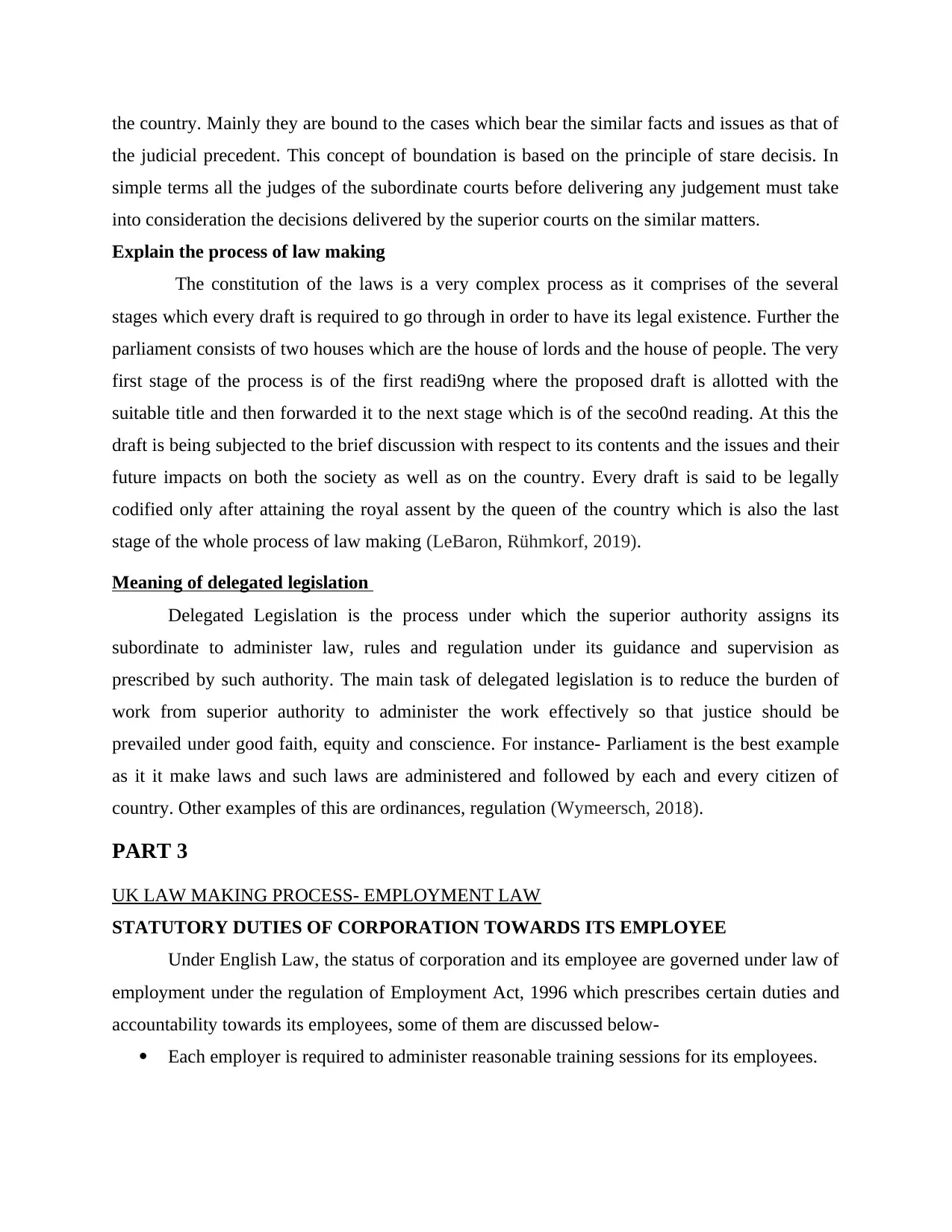
the country. Mainly they are bound to the cases which bear the similar facts and issues as that of
the judicial precedent. This concept of boundation is based on the principle of stare decisis. In
simple terms all the judges of the subordinate courts before delivering any judgement must take
into consideration the decisions delivered by the superior courts on the similar matters.
Explain the process of law making
The constitution of the laws is a very complex process as it comprises of the several
stages which every draft is required to go through in order to have its legal existence. Further the
parliament consists of two houses which are the house of lords and the house of people. The very
first stage of the process is of the first readi9ng where the proposed draft is allotted with the
suitable title and then forwarded it to the next stage which is of the seco0nd reading. At this the
draft is being subjected to the brief discussion with respect to its contents and the issues and their
future impacts on both the society as well as on the country. Every draft is said to be legally
codified only after attaining the royal assent by the queen of the country which is also the last
stage of the whole process of law making (LeBaron, Rühmkorf, 2019).
Meaning of delegated legislation
Delegated Legislation is the process under which the superior authority assigns its
subordinate to administer law, rules and regulation under its guidance and supervision as
prescribed by such authority. The main task of delegated legislation is to reduce the burden of
work from superior authority to administer the work effectively so that justice should be
prevailed under good faith, equity and conscience. For instance- Parliament is the best example
as it it make laws and such laws are administered and followed by each and every citizen of
country. Other examples of this are ordinances, regulation (Wymeersch, 2018).
PART 3
UK LAW MAKING PROCESS- EMPLOYMENT LAW
STATUTORY DUTIES OF CORPORATION TOWARDS ITS EMPLOYEE
Under English Law, the status of corporation and its employee are governed under law of
employment under the regulation of Employment Act, 1996 which prescribes certain duties and
accountability towards its employees, some of them are discussed below-
Each employer is required to administer reasonable training sessions for its employees.
the judicial precedent. This concept of boundation is based on the principle of stare decisis. In
simple terms all the judges of the subordinate courts before delivering any judgement must take
into consideration the decisions delivered by the superior courts on the similar matters.
Explain the process of law making
The constitution of the laws is a very complex process as it comprises of the several
stages which every draft is required to go through in order to have its legal existence. Further the
parliament consists of two houses which are the house of lords and the house of people. The very
first stage of the process is of the first readi9ng where the proposed draft is allotted with the
suitable title and then forwarded it to the next stage which is of the seco0nd reading. At this the
draft is being subjected to the brief discussion with respect to its contents and the issues and their
future impacts on both the society as well as on the country. Every draft is said to be legally
codified only after attaining the royal assent by the queen of the country which is also the last
stage of the whole process of law making (LeBaron, Rühmkorf, 2019).
Meaning of delegated legislation
Delegated Legislation is the process under which the superior authority assigns its
subordinate to administer law, rules and regulation under its guidance and supervision as
prescribed by such authority. The main task of delegated legislation is to reduce the burden of
work from superior authority to administer the work effectively so that justice should be
prevailed under good faith, equity and conscience. For instance- Parliament is the best example
as it it make laws and such laws are administered and followed by each and every citizen of
country. Other examples of this are ordinances, regulation (Wymeersch, 2018).
PART 3
UK LAW MAKING PROCESS- EMPLOYMENT LAW
STATUTORY DUTIES OF CORPORATION TOWARDS ITS EMPLOYEE
Under English Law, the status of corporation and its employee are governed under law of
employment under the regulation of Employment Act, 1996 which prescribes certain duties and
accountability towards its employees, some of them are discussed below-
Each employer is required to administer reasonable training sessions for its employees.
⊘ This is a preview!⊘
Do you want full access?
Subscribe today to unlock all pages.

Trusted by 1+ million students worldwide
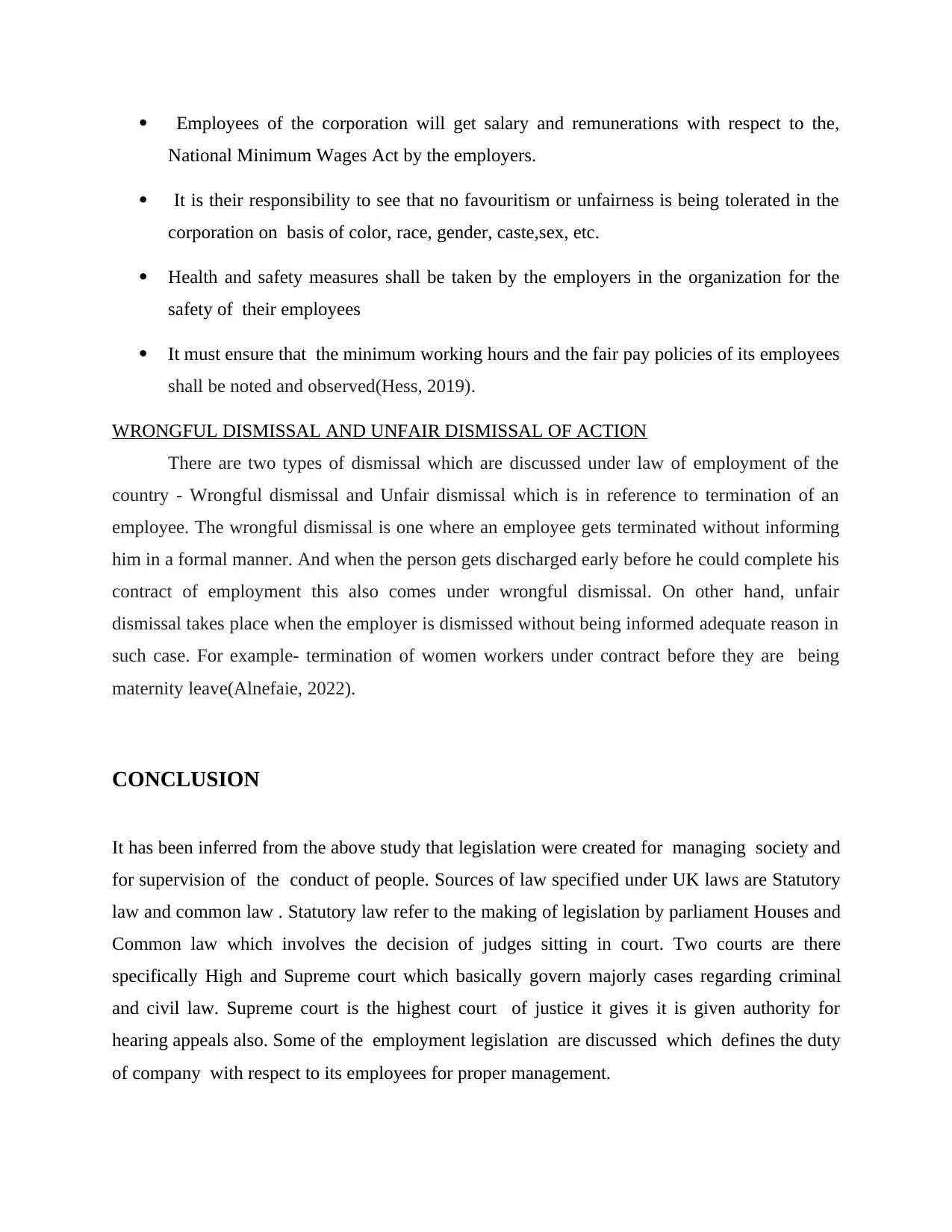
Employees of the corporation will get salary and remunerations with respect to the,
National Minimum Wages Act by the employers.
It is their responsibility to see that no favouritism or unfairness is being tolerated in the
corporation on basis of color, race, gender, caste,sex, etc.
Health and safety measures shall be taken by the employers in the organization for the
safety of their employees
It must ensure that the minimum working hours and the fair pay policies of its employees
shall be noted and observed(Hess, 2019).
WRONGFUL DISMISSAL AND UNFAIR DISMISSAL OF ACTION
There are two types of dismissal which are discussed under law of employment of the
country - Wrongful dismissal and Unfair dismissal which is in reference to termination of an
employee. The wrongful dismissal is one where an employee gets terminated without informing
him in a formal manner. And when the person gets discharged early before he could complete his
contract of employment this also comes under wrongful dismissal. On other hand, unfair
dismissal takes place when the employer is dismissed without being informed adequate reason in
such case. For example- termination of women workers under contract before they are being
maternity leave(Alnefaie, 2022).
CONCLUSION
It has been inferred from the above study that legislation were created for managing society and
for supervision of the conduct of people. Sources of law specified under UK laws are Statutory
law and common law . Statutory law refer to the making of legislation by parliament Houses and
Common law which involves the decision of judges sitting in court. Two courts are there
specifically High and Supreme court which basically govern majorly cases regarding criminal
and civil law. Supreme court is the highest court of justice it gives it is given authority for
hearing appeals also. Some of the employment legislation are discussed which defines the duty
of company with respect to its employees for proper management.
National Minimum Wages Act by the employers.
It is their responsibility to see that no favouritism or unfairness is being tolerated in the
corporation on basis of color, race, gender, caste,sex, etc.
Health and safety measures shall be taken by the employers in the organization for the
safety of their employees
It must ensure that the minimum working hours and the fair pay policies of its employees
shall be noted and observed(Hess, 2019).
WRONGFUL DISMISSAL AND UNFAIR DISMISSAL OF ACTION
There are two types of dismissal which are discussed under law of employment of the
country - Wrongful dismissal and Unfair dismissal which is in reference to termination of an
employee. The wrongful dismissal is one where an employee gets terminated without informing
him in a formal manner. And when the person gets discharged early before he could complete his
contract of employment this also comes under wrongful dismissal. On other hand, unfair
dismissal takes place when the employer is dismissed without being informed adequate reason in
such case. For example- termination of women workers under contract before they are being
maternity leave(Alnefaie, 2022).
CONCLUSION
It has been inferred from the above study that legislation were created for managing society and
for supervision of the conduct of people. Sources of law specified under UK laws are Statutory
law and common law . Statutory law refer to the making of legislation by parliament Houses and
Common law which involves the decision of judges sitting in court. Two courts are there
specifically High and Supreme court which basically govern majorly cases regarding criminal
and civil law. Supreme court is the highest court of justice it gives it is given authority for
hearing appeals also. Some of the employment legislation are discussed which defines the duty
of company with respect to its employees for proper management.
Paraphrase This Document
Need a fresh take? Get an instant paraphrase of this document with our AI Paraphraser
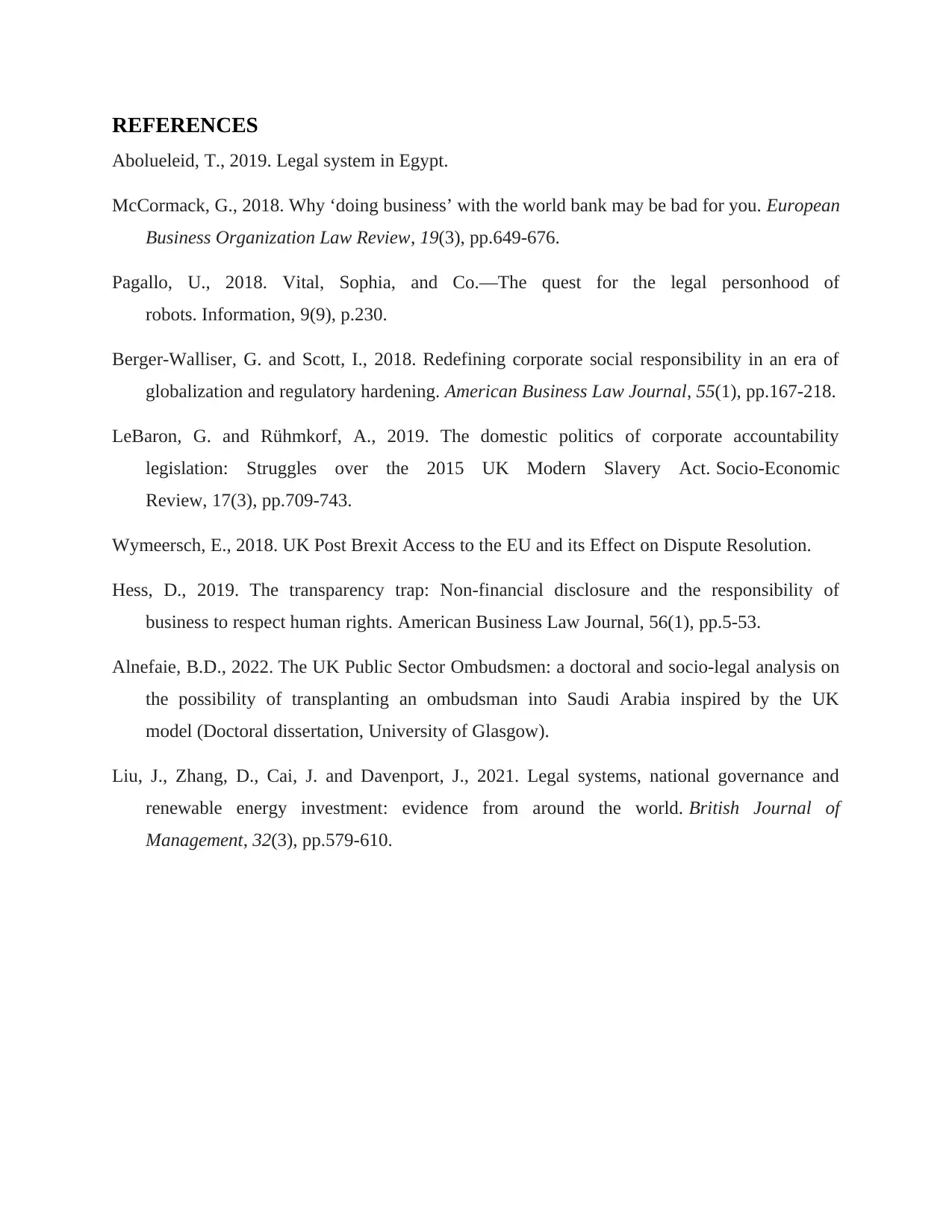
REFERENCES
Abolueleid, T., 2019. Legal system in Egypt.
McCormack, G., 2018. Why ‘doing business’ with the world bank may be bad for you. European
Business Organization Law Review, 19(3), pp.649-676.
Pagallo, U., 2018. Vital, Sophia, and Co.—The quest for the legal personhood of
robots. Information, 9(9), p.230.
Berger‐Walliser, G. and Scott, I., 2018. Redefining corporate social responsibility in an era of
globalization and regulatory hardening. American Business Law Journal, 55(1), pp.167-218.
LeBaron, G. and Rühmkorf, A., 2019. The domestic politics of corporate accountability
legislation: Struggles over the 2015 UK Modern Slavery Act. Socio-Economic
Review, 17(3), pp.709-743.
Wymeersch, E., 2018. UK Post Brexit Access to the EU and its Effect on Dispute Resolution.
Hess, D., 2019. The transparency trap: Non‐financial disclosure and the responsibility of
business to respect human rights. American Business Law Journal, 56(1), pp.5-53.
Alnefaie, B.D., 2022. The UK Public Sector Ombudsmen: a doctoral and socio-legal analysis on
the possibility of transplanting an ombudsman into Saudi Arabia inspired by the UK
model (Doctoral dissertation, University of Glasgow).
Liu, J., Zhang, D., Cai, J. and Davenport, J., 2021. Legal systems, national governance and
renewable energy investment: evidence from around the world. British Journal of
Management, 32(3), pp.579-610.
Abolueleid, T., 2019. Legal system in Egypt.
McCormack, G., 2018. Why ‘doing business’ with the world bank may be bad for you. European
Business Organization Law Review, 19(3), pp.649-676.
Pagallo, U., 2018. Vital, Sophia, and Co.—The quest for the legal personhood of
robots. Information, 9(9), p.230.
Berger‐Walliser, G. and Scott, I., 2018. Redefining corporate social responsibility in an era of
globalization and regulatory hardening. American Business Law Journal, 55(1), pp.167-218.
LeBaron, G. and Rühmkorf, A., 2019. The domestic politics of corporate accountability
legislation: Struggles over the 2015 UK Modern Slavery Act. Socio-Economic
Review, 17(3), pp.709-743.
Wymeersch, E., 2018. UK Post Brexit Access to the EU and its Effect on Dispute Resolution.
Hess, D., 2019. The transparency trap: Non‐financial disclosure and the responsibility of
business to respect human rights. American Business Law Journal, 56(1), pp.5-53.
Alnefaie, B.D., 2022. The UK Public Sector Ombudsmen: a doctoral and socio-legal analysis on
the possibility of transplanting an ombudsman into Saudi Arabia inspired by the UK
model (Doctoral dissertation, University of Glasgow).
Liu, J., Zhang, D., Cai, J. and Davenport, J., 2021. Legal systems, national governance and
renewable energy investment: evidence from around the world. British Journal of
Management, 32(3), pp.579-610.

⊘ This is a preview!⊘
Do you want full access?
Subscribe today to unlock all pages.

Trusted by 1+ million students worldwide

1 out of 10
Related Documents
Your All-in-One AI-Powered Toolkit for Academic Success.
+13062052269
info@desklib.com
Available 24*7 on WhatsApp / Email
![[object Object]](/_next/static/media/star-bottom.7253800d.svg)
Unlock your academic potential
Copyright © 2020–2025 A2Z Services. All Rights Reserved. Developed and managed by ZUCOL.